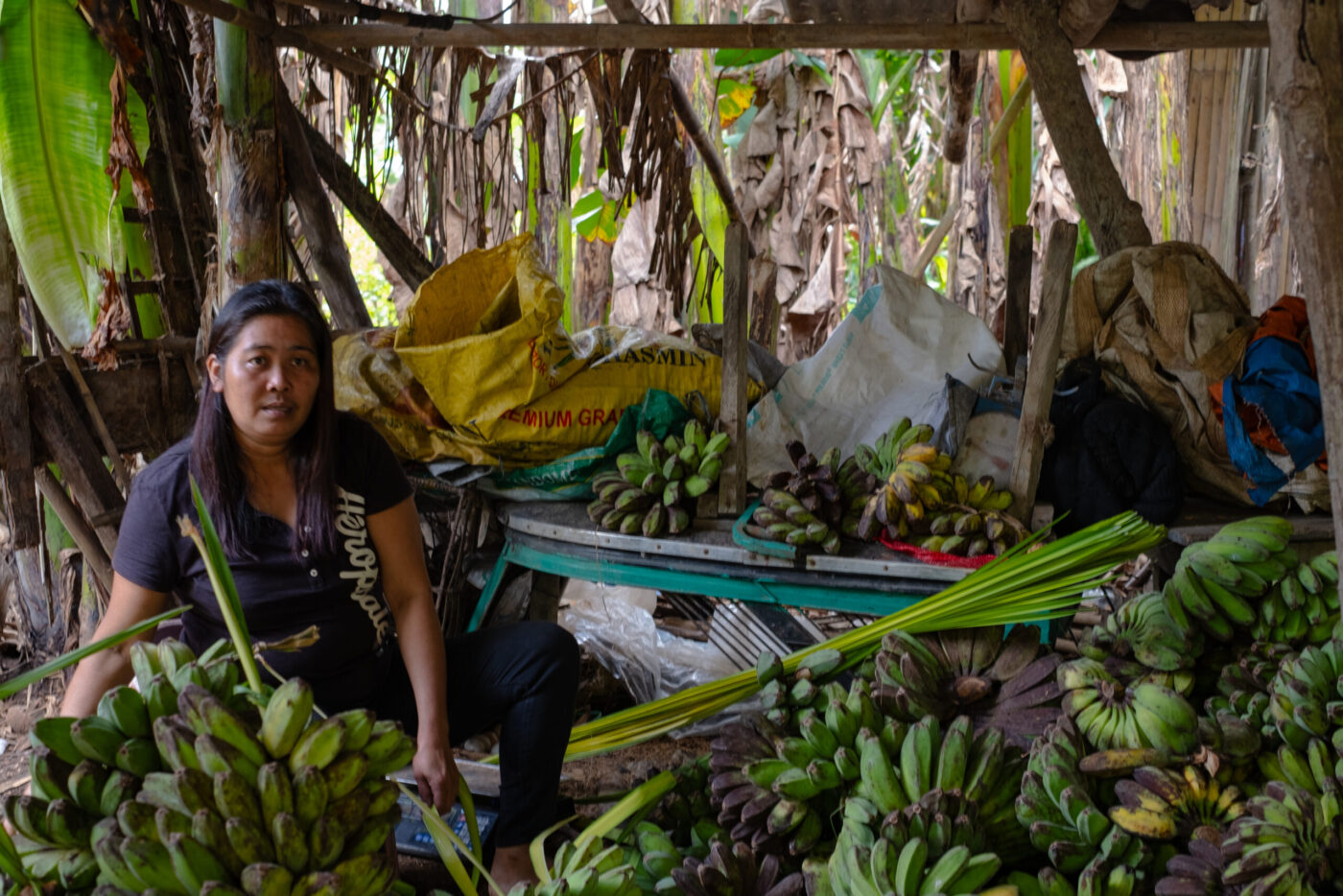At the rooster’s crow, the greenery of Tayabas City is filled by the blood, sweat, and tears of the women farmers who till the land they do not own.
TOIL AND turmoil surround the uneven yet beautiful fields of Tayabas City, Quezon Province. As the cool breeze passes through the unfinished houses made of scrap sheets of corrugated metal and recycled wooden frames, the women farmers diligently sow and reap their crops under the sun. They know full well that a month’s worth of harvest is barely enough to feed their family for a week.
To compensate for the days in between planting and harvest, the farmers usually take on side jobs. In their community, men usually go into construction while women would participate in freelance household work.
Farmers have been dealing with such age-old issues, with the already ailing agricultural industry suffering from deeper scars inflicted during the Martial Law. United by their shared yearnings, several agricultural organizations arose to demand change. One is Samahan ng mga Kababaihan at Magsasaka ng Tayabas (SAMAKATA), a small but determined group of farmers.
On infertile ground
Nanay Sita is a 65-year-old farmer and one of the founders of SAMAKATA. Serving as its President, she oversees both the community and its members. Through decades of false promises and paternalistic governance, Nanay Sita leads the organization to advocate for more efficient Coco Levy Fund rollouts and more effective Agrarian Reform programs.
Living on borrowed time with constant fear has become part of their lifestyle. Similarly, farmers like Nanay Peying do not only think about where they can get the resources they need to survive. They are also burdened by the reality of having no permanent place to call home. The land they till and the source of their livelihood and sustenance is not theirs.
Their struggles extend beyond the fields. Aside from a lack of land, Nanay Peying juggles her responsibilities as a farmer with other side rackets—as a wife and mother to four children. She starts her mornings with her husband visiting their coconut grove for their Lambanog production and processing their other plants and crops.
Nanay Peying works continuously even inside their home doing household chores. Though exhaustion may tug at her, she snatches moments for herself during her favorite noon-time show while transforming woods and bamboo into sturdy barbecue sticks as an additional source of income. Until the night, she and the SAMAKATA farmers alike fight for a better life.
From juggling agricultural to familial work, women farmers also have to fight for their places in the industry. Simultaneously, Nanay Malou witnessed firsthand the traditional setup. The gender imbalances that persist in the agricultural workforce have led to systemic discrimination, such as unequal land rights, making their struggles uniquely their own.
As a response, SAMAKATA focused on empowering women farmers by championing equitable participation, representation, and decision-making power within and in the broader landscape. For instance, the women of SAMAKATA have the final say for the matters affecting the community. However, despite the organization’s efforts to highlight women farmer’s contributions, Nanay Malou believes that much is left to be done.
Decades of dormancy and decay
Nanay Malou was once a farmer. Now, she is an ambulant vendor.
She usually starts her day at 2 AM alongside her husband to go to the market. As they travel amid the dark and cool breeze of the night, the couple rides a tricycle and carries with them hundreds of kilos of saba banana. Upon reaching the market, they sell the bananas to middlemen for a measly Php 15 to 20 per kilo.
When they eventually sell out their stock, she and her husband buy other products that the community needs. For her, the income they receive from their early morning trips to and from the market is enough to get by without sickness and emergency.
“Samahan mo ng sipag, ‘wag kang titigil, bawal ka lumiban… Sapat siya sa isang payak na pamumuhay na walang luho. Sapat siya sa isang pamilya na walang may sakit. Sapat siya sa isang pamilya na walang nagkukulehiyo,” she explains.
(Complement it with hard work, perseverance, and no absences… It’s enough for a simple life, a life without luxury. It’s enough for a family without sickness. It’s enough for a family without children in college.)
However, life was not always merely bearable for them.
When Nanay Malou and her husband started to farm, they did not have enough capital to buy seeds, fertilizers, and pesticides. This situation forced them to borrow money, furthering them into debt and financial paralysis.
Unlike the typical cash lending process, farmers in Tayabas usually undergo sa-palay, a type of cash lending where farmers would borrow and accept extremely high interest rates from loan sharks. After an agreed period of time, they would have to pay their debt through sacks of rice which amounted to a lot more than what they originally took.
Come harvest time, making a living is not guaranteed. They have to pay off whatever debt they incurred. They would be at the whims of chance—some days doing well, while some days selling badly with low prices due to a typhoon, an oversupply, or simply a lack of storage space. They would often sell to big capitalists who take advantage of their circumstances. During the days before they were ambulant vendors, Nanay Malou and Tatay Rene would be left with no profit—or even worse, a loss of livelihood.
Harvesting reality
Despite the fight of the women farmers of Tayabas and those all over the country, little progress has been made towards supporting the agricultural industry in the country and most importantly, the people behind it.
“Paano mo pagtutuunan ng pansin bilang isang [pinuno] ang sitwasyon ng mga magsasaka, kung ikaw mismo ay hindi bumababa sa lugar na ‘yun? Hindi mo nararanasan, hindi mo nakikita,” Nanay Malou says.
(How could you change the situation of farmers as a government official if you yourself have not come to the fields—if you don’t experience or see it for yourself?)
Nanay Sita sees the same situation happening to her as it had happened with her father decades ago. To this day, she still has not received any centavo out of the Coco Levy Fund, which was stolen from the blood, sweat, and tears of her late father’s generation. Despite the many broken promises that familiar political families make, she continues the fight for the farmers of the past and present. After all, being in the agricultural industry is a constant dance with uncertainty.
Weather’s whims can turn the vibrant fields into dust overnight, wiping out months of hard labor and leaving hope hanging by a thread. The land issues and unfair splits Nanay Peying and other farmers experienced resulted in the imbalance of power that has always marginalized them. The landowners and retailers dictate prices and terms, leaving farmers with little to no room for negotiation gnawing a sense of helplessness.
“Sadyang nasanay na lang kami sa ganito. ‘Yung mga taong may kaya, pinagsasamantalahan ‘yung kahirapan at kahinaan namin,” Nanay Sita elucidates.
(We just got used to this. Those who have the means exploit us because we are poor and weak.)
The green fields turn into battlefields. After decades of being trapped in a system stacked against them, farmers are left with no choice but to try to break the cycle. Until then, the verdant fields of Tayabas hold silent witness to a paradox—the farmers who nurture life itself to produce food are the same people who struggle to secure a stable life for their families.







